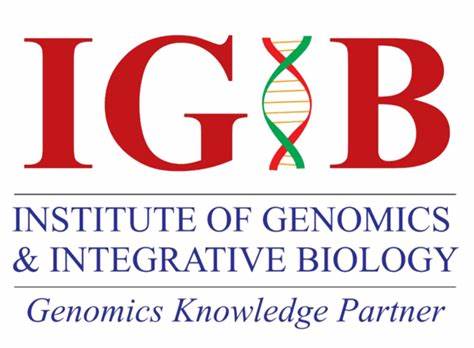
The Institute of Genomics and Integrative Biology (IGIB)

The Institute of Genomics and Integrative Biology (IGIB)
is a premier research institution in India, focused on the fields of genomics, bioinformatics, systems biology, and integrative biology. It is an autonomous research laboratory under the Council of Scientific and Industrial Research (CSIR), an organization of the Government of India. IGIB is renowned for its cutting-edge research in genomic technologies, molecular biology, computational biology, and bioinformatics, with a goal to address challenges in human health, agriculture, and environmental sustainability through genomic and integrative biological research.
Address and Zip Code:
Institute of Genomics and Integrative Biology (IGIB)
Mall Road,
Delhi – 110007,
India
Zip Code: 110007
Introduction to IGIB
The Institute of Genomics and Integrative Biology (IGIB) was established in 2002 with a mission to advance knowledge in genomics, bioinformatics, systems biology, and other interdisciplinary fields of biology. IGIB is dedicated to using genomics and bioinformatics tools to study complex biological systems and understand the molecular mechanisms underlying health and disease. The institute is known for its groundbreaking research in areas such as genetic diseases, cancer biology, infectious diseases, and biotechnology, making it a key player in India’s growing biotechnology and biomedical research landscape.
IGIB’s research focus spans across several domains, including genomics, systems biology, integrative biology, molecular genetics, and bioinformatics. It aims to bridge the gap between basic and applied biological research by combining experimental and computational approaches to understand the fundamental biological processes that regulate health and disease.
Objectives and Research Areas
The primary objectives of IGIB include promoting genomics research, developing innovative bioinformatics tools, and using integrative biology approaches to understand disease mechanisms and identify potential therapeutic targets. The institute conducts both basic and translational research with a focus on the following key areas:
- Genomic Medicine and Health: One of the main goals of IGIB is to explore the genetic basis of human diseases, particularly those prevalent in the Indian population. The institute conducts extensive research into genetic disorders, rare diseases, and complex diseases such as cancer, diabetes, and neurological disorders. Through genomics research, IGIB aims to uncover new insights into disease mechanisms, which can ultimately lead to the development of novel diagnostic and therapeutic strategies.
- Infectious Disease Research: IGIB is actively involved in research on infectious diseases, including tuberculosis, malaria, and HIV/AIDS. Using genomics and bioinformatics tools, the institute studies the genetic makeup of pathogens and host-pathogen interactions to identify potential biomarkers and therapeutic targets for these diseases. This research is particularly important in the context of antimicrobial resistance and emerging infectious diseases.
- Systems Biology and Integrative Biology: Systems biology is a multidisciplinary field that seeks to understand biological systems by studying the interactions between various components, including genes, proteins, and metabolites. IGIB integrates genomics, proteomics, and metabolomics to study the complexity of biological systems and to gain insights into cellular processes such as signal transduction, metabolic pathways, and gene regulation.
- Bioinformatics and Computational Biology: As genomics data becomes increasingly complex, bioinformatics plays a crucial role in analyzing and interpreting this data. IGIB has a strong emphasis on computational biology, developing algorithms and software tools for genomic data analysis, sequence alignment, gene expression analysis, and data integration. The institute also focuses on developing machine learning and artificial intelligence techniques to improve the accuracy and efficiency of bioinformatics analyses.
- Cancer Genomics: IGIB’s research on cancer genomics focuses on understanding the genetic mutations and molecular mechanisms that drive cancer. Researchers at IGIB use high-throughput sequencing technologies to study the genetic profiles of various cancers, with a focus on understanding how mutations affect key cellular pathways and contribute to cancer progression. This research is aimed at identifying new therapeutic targets and developing personalized cancer treatments based on the genetic makeup of individual patients.
- Agrigenomics: In addition to human health research, IGIB is also involved in agrigenomics, studying the genetic makeup of crops and livestock to improve agricultural productivity and sustainability. By using genomics tools, the institute aims to identify genes that control desirable traits such as disease resistance, yield, and nutritional content. This research has the potential to contribute to food security and sustainable agriculture in India and beyond.
Education and Training at IGIB
IGIB is also committed to training the next generation of scientists and researchers in genomics and bioinformatics. The institute offers various educational programs, including:
- Ph.D. Programs: IGIB offers a Ph.D. program in collaboration with several academic institutions, providing students with an opportunity to work on cutting-edge research projects in genomics, bioinformatics, and related fields. Ph.D. students at IGIB have access to state-of-the-art research facilities and work with leading scientists in the field.
- Postdoctoral Fellowship: The institute offers postdoctoral fellowships to young scientists interested in pursuing advanced research in genomics, systems biology, and bioinformatics. These fellowships provide opportunities for interdisciplinary research and collaboration with international research groups.
- Workshops and Training Programs: IGIB conducts workshops, seminars, and training programs in various aspects of genomics, bioinformatics, and molecular biology. These programs are designed to help students and professionals gain hands-on experience in genomic data analysis, molecular techniques, and computational tools.
- Collaborative Training with Industry: IGIB also collaborates with industry partners to provide training opportunities for professionals in the biotechnology and pharmaceutical sectors. These collaborations help bridge the gap between academic research and industrial applications, particularly in drug discovery, diagnostics, and personalized medicine.
Infrastructure and Facilities
IGIB is equipped with state-of-the-art infrastructure and facilities to support advanced research in genomics and integrative biology. The institute boasts several specialized laboratories and core facilities, including:
- Next-Generation Sequencing (NGS) Facility: IGIB has one of the most advanced NGS facilities in India, equipped with high-throughput sequencing platforms such as Illumina and PacBio. These platforms are used for whole-genome sequencing, transcriptome analysis, and targeted sequencing of specific genes or regions.
- Bioinformatics and Computational Biology Lab: The bioinformatics lab is equipped with powerful computing resources to handle large genomic datasets. The institute develops and applies computational tools for data analysis, sequence alignment, gene expression profiling, and network analysis.
- Cell Culture and Molecular Biology Facilities: The institute has well-equipped laboratories for cell culture, protein expression, and molecular biology experiments. These facilities support research on gene function, protein interactions, and molecular mechanisms of disease.
- Proteomics and Metabolomics Facilities: IGIB has advanced mass spectrometry-based platforms for proteomics and metabolomics research. These platforms are used to study the protein and metabolite profiles of cells, tissues, and organisms, providing insights into the molecular basis of disease.
- Animal Research Facility: The institute has a dedicated animal research facility that supports studies involving animal models of disease. This facility is essential for preclinical research and testing of potential therapeutic interventions.
Collaborations and Outreach
IGIB actively collaborates with national and international academic institutions, government agencies, and private industry. These collaborations help advance the institute’s research agenda and provide opportunities for knowledge exchange and joint projects. Some of the key collaborations include:
- International Collaborations: IGIB partners with leading research institutions in the United States, Europe, and Asia to conduct joint research projects, exchange knowledge, and access global research networks.
- Industry Partnerships: The institute works closely with pharmaceutical, biotechnology, and healthcare companies to translate research findings into practical applications. These collaborations focus on drug discovery, diagnostic development, and personalized medicine.
- Government Collaborations: IGIB collaborates with various government agencies, including the Ministry of Science and Technology and the Ministry of Health and Family Welfare, to address public health challenges, develop genomic policies, and promote biotechnology innovation in India.
Achievements and Impact
IGIB has made significant contributions to the fields of genomics, bioinformatics, and systems biology. Some of its key achievements include:
- Genomic Mapping of Indian Populations: IGIB has conducted studies on the genetic diversity of Indian populations, providing valuable insights into the genetic factors that contribute to diseases prevalent in India.
- Cancer Genomics: The institute has made significant contributions to cancer genomics, identifying genetic mutations associated with various cancers, including lung cancer and breast cancer. This research has led to the development of potential biomarkers for cancer diagnosis and treatment.
- Infectious Disease Research: IGIB’s work on tuberculosis and malaria genomics has helped in identifying genetic factors related to drug resistance, leading to more effective treatments for these diseases.
- Development of Bioinformatics Tools: IGIB has developed several bioinformatics tools and databases that are widely used in genomics research, including tools for genomic data analysis, protein structure prediction, and gene annotation.
Conclusion
The Institute of Genomics and Integrative Biology (IGIB) stands as a leading research institution at the forefront of genomics and systems biology in India. Through its innovative research in genomics, bioinformatics, and integrative biology, IGIB is making significant strides in understanding the molecular basis of health and disease. With state-of-the-art facilities, a strong focus on interdisciplinary research, and collaborations with global research networks, IGIB continues to contribute to advancements in science and technology that impact healthcare, agriculture, and biotechnology. As the institute continues to grow, its work will play a key role in shaping the future of genomic research in India and beyond
Courses/Programs
| Serial# | Title | Estimated Cost | Program type |
|---|
